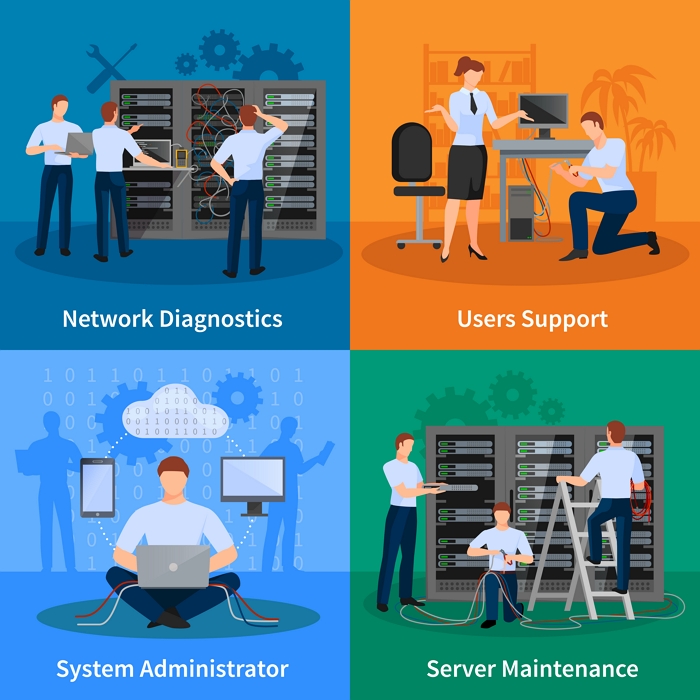What is MSP (Managed Service Provider) & How to Choose One?
An MSP or Managed Service Provider is a strategic and effective solution for today’s business and IT needs. MSPs typically offer a wide range of IT services for their clients and establish long-term partnerships with them over multi-year or annual periods.
MSPs also earn recurring income for their continuous services. Although any type or form of modern business can seek out the help of an MSP according to their specific needs, these providers most often cater to small and medium-sized businesses that are understaffed and other organizations that don’t have any in-house IT staff at all.
1 What is an MSP?
An MSP or managed service provider is an outsourced third-party company responsible for the daily ongoing tasks of maintenance and monitoring as well as functions of another company, their client. A contract ties the client and the provider together with a standardized service level agreement. This SLA specifies the expectations and quality metrics of the services on offer.

MSPs most frequently render off-site support for IT infrastructure which encompasses network monitoring, security, and connectivity. They also offer a plethora of services for businesses including comprehensive management of business functions. These include overseeing the supply chain and demand, payroll administration, and supervision of continuous functions of a skilled and agile contingent workforce.
MSPs provide helpful advice and consultation on the tools and technologies most suitable for your business. They can also come up with customized programs depending on your specific objectives, goals, and needs. They even oversee the program’s implementation and manage the everyday maintenance and operation of these crucial functions.
2 The Role of Managed Service Providers
With the ever-growing demand for IT skills but with the limited supply, MSPs can offer valuable support to help customers scale to cater to a new initiation with no need to train and add more headcount.
Managed Service Providers can also offer specialized skills in different areas of required technology. In addition, MSPs often have experience in various environments to deliver valuable expertise in vetting potential solutions or tackling challenges.
A Managed Service Provider can help at different stages of the IT lifecycle of its client, such as:
- ● IT operations, security performance, and network monitoring
- ● Creation of IT programs and policies
- ● Evaluation or scoping of possible IT solutions
- ● Implementation of IT solutions
What Does an MSP Do?
The most common services that MSPs provide are:
- ● Remote monitoring and management (RMM)
- ● Help desk support
- ● Data backup and disaster recovery (BDR)
- ● Network security and cybersecurity
- ● IT consultation and planning
- ● Configuration optimization and management
- ● Contract management
- ● Hardware repair
- ● Management of IT infrastructure and user access accounts
- ● Application and network management or monitoring
- ● Risk management and compliance
- ● Software installation, patching, and updating
- ● Technical support for staff

Datasheet for Mobile Device Management (MDM)
If you are looking for a better solution to manage your mobile devices, you’ll want to grab our Datasheet for MDM. It’s loaded with detailed information to help you make the best decision for your organization's needs.
3 Benefits of Partnering with an MSP
The best MSP offers a long list of benefits to various sizes of businesses and organizations. The following are some of the top benefits you will get to enjoy once you partner with a reliable and qualified managed IT provider:
1 Cost-Effectiveness
It can get quite expensive to hire and train new employees and purchase hardware. Working with MSP eliminates the need for additional training expenses and capital while letting you budget the exact cost every month.
2 24/7 Monitoring and Support
Availability will never be an issue with an MSP thanks to their 24/7 monitoring and support. It gives you peace of mind knowing that someone is there whenever you need help the most.

3 Scalability and Flexibility
Your system must be able to scale depending on your changing technology needs over time. MSPs are highly scalable and flexible, responding in real time to changes in demand so system downtime will never be an issue. They also offer more advanced services including reporting, proactive monitoring, and more to make the most out of your partnership.
4 Expertise and Specialization
With every new technology come new problems that your in-house team might not have the experience or knowledge to solve. One of the biggest benefits of working with an MSP is that it allows you to hire a team of IT experts at a fixed monthly rate.
5 Data Backup and Disaster Recovery
A good MSP can protect your data and ensure that your business can recover from disruptive events. These consistent backups are done to ensure that you don’t lose any information vital to your organization.
Managed Service Providers can either render a single niche service or completely replace the IT department of a company.
4 Who Should Consider Partnering With an MSP?
Partnering with an MSP can take a significant load off a company or organization, letting them focus on their core business goals. But who should work with these providers in the first place? Businesses with the following concerns or needs should consider working with a managed IT provider:
Businesses with limited in-house expertise
If the in-house IT team of your company is overwhelmed and fails to keep up with the current business demands, it might be high time to think about working with an MSP.
Businesses that require 24/7 monitoring
Outdated security systems can put a business and its clients at serious risk. A reliable MSP will offer state-of-the-art security features like 24/7 monitoring, anti-virus software, firewall protection, multi-factor authentication and strong password policies, and cybersecurity training for employees.
Businesses gearing up for constant growth
Constant and rapid growth means your IT needs should also keep up with it. MSPs offer scalable solutions that can keep up with the changing needs of your company.
Businesses that want to lower IT maintenance costs
IT maintenance is not cheap but with the help of an MSP, you can significantly cut down your in-house costs by up to 40%.

5 How to Choose a Managed Service Provider
Here are some tips to help businesses evaluate their IT needs and identify the most suitable partner for their MSP needs:
• Expertise and Experience
Choose an MSP that provides expertise and experience beyond that of your in-house team as well as access to specialist IT vendors. The best MSP is experienced across various industries with strong references and excels in different situations.
• Range of Services Offered
A reputable MSP offers an extensive range of services. See to it that you choose an MSP that can provide all the things you need, eliminating the need to outsource some tasks and responsibilities. It’s also recommended to work with an MSP who can grow with you and your business.
• Service Level Agreements (SLAs) and Response Times
SLAs outline all responsibilities of the parties involved and guarantee certain things. They may also indicate guaranteed response times for service uptime or open tickets. An MSP must also respond fast to the problems and needs of your company.
• Client Testimonials
Due diligence is critical before you commit to an MSP. It’s never enough to just check their sales collateral and website. Before anything else, make sure you check client testimonials as these are the best way to learn more about them.
• Security and Compliance Measures
A good MSP will also ensure that your network is always safe and protected from hackers and cybercriminals. See to it that your MSP plan includes security and compliance measures, with regular security monitoring and testing for attacks.
6 Why Should You Consider MSP services with MDM?
Considering an MSP with an MDM (Mobile Device Management) solution can offer several significant benefits for your organization.
Benefits include:
- MDM solutions help strengthen the security of your mobile devices by enforcing security policies, implementing encryption, and enabling remote device wiping in case of loss or theft.
- Your MSP can centrally manage and monitor all your mobile devices, regardless of their location. This streamlines the management process, allowing for quick updates, troubleshooting, and policy enforcement across the entire fleet of devices.
- An MSP with MDM expertise can help ensure your organization complies with specific data protection regulations, reducing the risk of penalties and legal issues.
- If your organization allows employees to use personal devices for work-related tasks, MDM can help segregate work-related data from personal data, ensuring better security and privacy.
Overall, an MSP with an MDM solution can help you optimize your mobile device management, enhance security, and achieve better control and efficiency in your organization's IT infrastructure. Before selecting an MSP, consider your specific requirements, evaluate their capabilities, and choose a partner that aligns well with your business objectives.
7 Conclusion
Modern businesses have unique IT needs that will help them keep up with the ever-changing market and business environment. With the help of a trusted MSP or Managed IT Provider, small to medium-sized businesses can enjoy a wide range of services, from cybersecurity to IT consulting, network management, and more.
There are also many advantages associated with partnering with an MSP from access to specialized expertise to increased operational efficiency. Different types of businesses should also consider working with a reputable MSP carefully chosen using different criteria such as expertise and experience as well as security and compliance measures.






Leave a Reply.